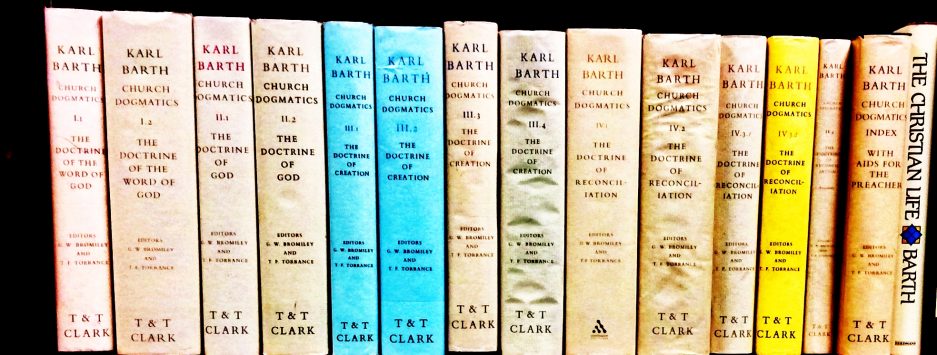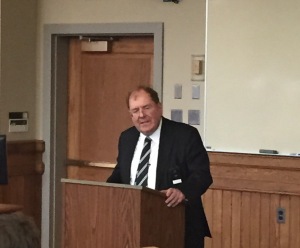I’m happy to be joining the Karl Barth Conference again this year at Princeton Theological Seminary. I will do my best to summarize in very brief form the plenary sessions this year. The overarching theme of the conference is Karl Barth’s Pneumatology and the Global Pentecostal Movement.
Sunday evening, June 19, began with an evening lecture from Dr. Michael Welker, who is professor of systematic theology at Heidelberg University. His topic was the Spirit and Creation.
Introduction
Welker began by reviewing what he believed was Barth’s, and his own, commitment to critical realism in theology. Theology is realistic in that it believes that God has independent reality to which theology seeks to speak. Theology is critical in that it must always be subject to correction and clarification.
1) Unfruitful and fruitful orientations in the doctrine of Creation.
Today, when the doctrine of creation is spoken of, there is a too-common assumption that creation speaks of the totality of nature. In this regard, “creation” is nearly equated with that which can be examined through the disciplines of biology, chemistry, physics, etc. Welker called this a “naturalist” orientation. Furthermore, he noted that even up until the middle of the twentieth century, creation was more closely associated with “mentalism” whereby the human in his or her “self-consciousness” and “consciousness of the world” constituted the prime focus of the doctrine of creation, i.e., creation as “spirit” or “spiritual.” This “mentalist” notion Welker connected with Descartes and Fichte.
Karl Barth, Welker argued, sought to give both nature and spirit their due, even if Barth “leaned slightly” toward the spirit end of the doctrine of creation. This is consistent with Barth’s emphasis on both the Word and Spirit. Furthermore, when Barth speaks of the “Spirit” of God, he also does so in a trinitarian framework. There is, in other words, no “non-trinitarian spirit” to speak of in respect of God. This admittedly may be of less interest to those who are seeking pneumatologies that are not so tied to the Christian conception of God. Barth’s form of pneumatology is thus problematic for those seeking a more “philosophically” oriented form of theism that is not necessarily tied to the Christian doctrine of the Trinity. For this, Welker made no apology: The doctrine of Creation, if it is to be Christian, relies on a trinitarian formulation. To speak of the Spirit of God is already to speak of the Trinity.
Barth refused to see creation only as natural or spiritual, but rather spoke of creation as the whole cosmos in relationship to full nexus of human culture and history. Creation cannot be “everything except humans and their culture and concepts.” The Christian doctrine of Creation includes the historical human culture as well as everything beyond it. More to the point, the Spirit of God, Barth insisted, is to be sought only in connection with the incarnation of the Word in human history. Thus, Welker argued, Barth resisted any notions of the Spirit in a doctrine of creation that “floats above” human history and bodily existence, and especially those notions of the Spirit that overlook or ignore the incarnation of the Word. Notions of spirit as “mind”, “pure transcendence” etc. are useless to Barth for a doctrine of creation.
2) God’s Power and Creation’s Autonomous Power
Welker pointed out that far too often in the history of theology, God’s power (omnipotence) has been portrayed–weakly–as the idea that “God has created everything.” This, he argued, runs roughshod over the biblical accounts of creation in which God is not portrayed as creating “everything,” but of creating heavens which have some independences, the plant and animal worlds which have their own manner of existing, and of course, human history and culture, including all the artifacts which humans have made. Barth also emphasized that creation itself is given “powers” which are able to come into direct conflict with God. Thus, whether these powers are political, religious, legal, social or moral, they are autonomous powers given to humans to exercise–powers which in the Gospels and Epistles are all portrayed as ironically coming into conflict with Jesus Christ. The main point, Welker noted, is that God’s omnipotence does not mean that God has effected by his power all that his power could enact, but that his power has given real autonomy to humanity in creation–autonomous power which can be used to serve or to rebel against God’s good creation.
3) Barth distinguishes between God’s Spirit and human & created spirits.
Welker suggested that ever since Aristotle, the human spirit has been closely associated with and unified with rationality. More specifically, this yields a God who is by definition one whose knowledge of the world is unified with the world itself.
Barth, Welker notes, strictly resisted the conflation of the divine and human spirits. Indeed, for Barth, though the Spirit of God gives freedom, he nevertheless is a Spirit who “commands” and “rules” the human spirit.
In this regard, Welker noted that despite Barth’s insistence of the distinction between the divine and human spirits, he was nevertheless still too influenced by the binary polarity that inheres in the Aristotelian notion transmitted through the history of philosophy and theology. Welker thinks this shows up in Barth by his continuing to posit the tension between body and spirit–an inherent dualism which Welker admits also appears even in the Apostle Paul’s “flesh/spirit” distinction. However, in light of more recent scholarly (e.g., Gerd Thiessen) work on Paul which sees the spiritual, rational, social, etc. dimensions inhering more inherently in the Pauline concept of “body” or “flesh”, Welker argued for the need to be prepared to explore, intellectually and conceptually, at the level of a “poly-polarities” which shows up in the multiplicity of ways the Spirit of God is joined to and gifts humanity. There are many bodies in multilayered manners of relational joining. In this regard, Welker went on to suggest that Barth already had a concept at hand which could have helped him break out of the bipolarity which still marked his own penumatology and anthropology. This concept is the biblical idea of the “outpouring of the Spirit” which, of course, Barth explored extensively in CD IV.
4) God’s Creative Action in Creation and the Outpouring of the Spirit
In order to move beyond bipolar ways of thinking about the Spirit, Welker advocated the notion of the “outpouring of the Spirit” which can be most clearly discerned in the book of Act–and which, of course, Barth explores extensively in CD IV. It is in Acts that we see the outpouring of the Spirit not simply in the union of the body and soul, as it were, but in a multitude of ways which was manifest in the community. These include works of service (diaconate), prophecy, and priestly ministries, which concretely include word manifesations (including preaching and the Pentecostal phenomena of prophecy and tongues), freeing from spiritual and physical oppression (demonic, illnesses), and through caring for one another’s needs–all done in recognition that the Word became flesh and dwelt among us. Although there is a biblical concept of “inpouring of the Spirit,” the church–widely–has still focused more on the indwelling of the Spirit in the individual soteriology, and often to the exclusion fo the “outpouring” o fthe Spirit on the community and its multiple forms of ministry.

